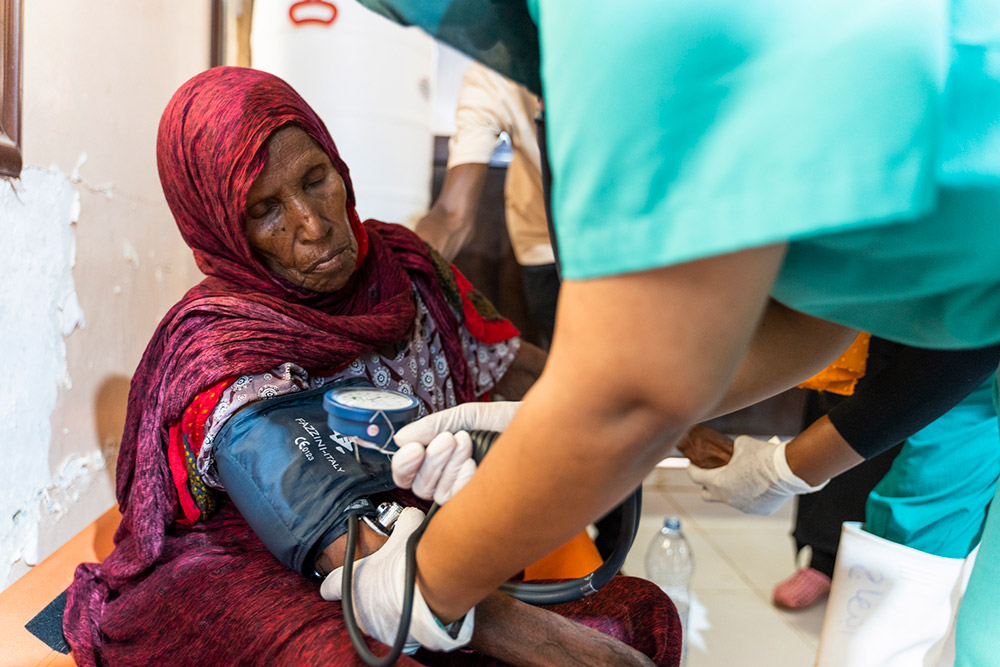 A patient receives care at the cholera treatment centre, Gadarif, in October 2023. The centre admits 46 cases a day on average and has a laboratory and pharmacy to support its operations. Photo credit: WHO/A. Kheir
A patient receives care at the cholera treatment centre, Gadarif, in October 2023. The centre admits 46 cases a day on average and has a laboratory and pharmacy to support its operations. Photo credit: WHO/A. Kheir
8 February 2024 – Almost 10 months since conflict escalated in Sudan in April 2023, the ever-deteriorating humanitarian situation has led to the world’s largest displacement crisis. About 8 million people in Sudan have been displaced by the conflict, with 6 million people internally displaced and 1.8 million people displaced to neighbouring countries.
A displacement crisis of this magnitude has significant impacts on the health needs of displaced and host populations. As well as being at higher risk of disease due to overcrowded settings, people have limited access to safe drinking water, food and essential life-saving health services.
Sudan’s health crisis is made worse by food insecurity. The latest reports on the deteriorating situation indicate that nearly 18 million people – 37% of the population – are food insecure, including 4.9 million people who already face emergency levels of food insecurity. Acute hunger and malnutrition will have a lasting generational impact on the health of the population. They also increase vulnerable groups’ risk of medical complications and death from disease outbreaks such as cholera and measles.
Access to critical health services is severely limited, with 70–80% of health facilities in conflict-affected areas either inaccessible or nonfunctional. This places significant strain on and risks overwhelming the remaining facilities due to the influx of people seeking care.
People are dying from lack of access to basic and essential health care and medicines, including to manage severe acute malnutrition and to treat chronic conditions such as hypertension, diabetes, kidney failure and cancer. Pregnant women and children are also at increased risk of illness and death given the disruptions to maternal and child health care services, including access to life-saving childhood vaccinations.
Conflict, population movements, and access constraints for implementing partners have left the disease surveillance system fragmented. This has created serious gaps in health partners’ shared understanding of infectious disease outbreaks and in their ability to respond rapidly to such outbreaks. Since the ongoing cholera outbreak was declared in September 2023, 11 of Sudan’s 18 states have reported cholera, with 10 500 cases and 300 deaths recorded by 31 January 2024. While cases appear to show a decreasing trend overall, the actual number of cases and deaths may be much higher, since surveillance system accuracy is affected by access limitations.
Under the Sudan Humanitarian Needs and Response Plan 2024, close to 15 million people need urgent health assistance. Due to challenges with security, access, and resource availability, only one third of those in need – 4.9 million of the most vulnerable individuals – have been targeted by the Health Cluster. The Health Cluster, led by WHO, will require financial partners to meet 100% of the US$ 178 million funding request for 2024 to meet the health needs of the highly vulnerable target population.
WHO is calling on the international community to advocate for unhindered access for partners and to rapidly scale up and sustain support to address the urgent needs of the most vulnerable populations in Sudan. Alongside this, WHO is working on a no-regrets basis to implement an agile and adaptable response given the fluid security situation. WHO is also expanding capacity for cross-border operations to deliver critical support to implementing partners working in inaccessible and hard-to-reach areas.








